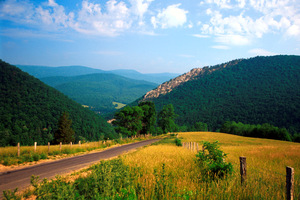
A canoe-shaped upland valley 10 miles long and two miles wide in western Pendleton County, Germany Valley has been eroded into the massive Wills Mountain Anticline. Southeast-dipping Tuscarora Sandstone forms prominent cliffs along the crest of North Fork Mountain. The strata are vertical in the River Knobs, the northwestern limb of the anticline, where the erosion-resistant Tuscarora is exposed in water gaps as impressive crags such as Seneca, Riverton, Judy, and Nelson rocks. Through these gaps the valley drains into the North Fork of the South Branch of the Potomac River.
Germany Valley is the most highly developed karst landscape in the Potomac watershed. Karst, which forms on the valley’s soluble limestones, is characterized by caves, sinkholes, and subterranean drainage. Judy Spring, the source of Mill Creek, is the main resurgence for an integrated network of underground streams. From the time of first settlement the fertile limestone soils supported a prosperous livestock husbandry.
German language, culture, and folklore have persisted well into the late 20th century in parts of Pendleton County. Germany Valley, despite its name and the German ancestry of many of its residents, generally is not considered one of those places. However, topographic features preserve the surnames of mostly German early settlers: Harman Hills, Bland Hills, and Dolly Ridge within the valley; Harper Gap, Hinkle Gap, and Judy Gap along the River Knobs. About 1760, John Justus Hinkle built a blockhouse and stockade known as Hinkle’s Fort.
Seneca Caverns, one of three major caves within the valley, was opened to the public as a tourist attraction in 1930. The Greer Lime Company began production at Key near Judy Spring in 1960. The quarry has periodically expanded its operations in the New Market Limestone, nearly pure calcium carbonate.
This Article was written by John Craft Taylor
Last Revised on February 14, 2023
Related Articles
Sources
Calhoun, H. M. 'Twixt North and South. Franklin: McCoy Pub., 1974.
Perry, William J. Jr. The Wills Mountain Anticline. Morgantown: West Virginia Geological & Economic Survey, 1978.
Carvell, Kenneth L. Germany Valley. Wonderful West Virginia, (Sept. 2000).
Cite This Article
Taylor, John Craft "Germany Valley." e-WV: The West Virginia Encyclopedia. 14 February 2023. Web. 26 July 2024.


Comments?
There aren't any comments for this article yet.
Click here to read and contribute to the discussion →